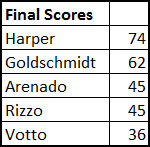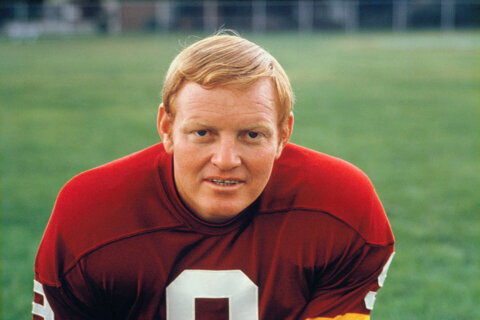WASHINGTON — If you’ve clicked over here to express your thoughts about how many rings Bryce Harper doesn’t have, or to spout tired tropes about how full he is of himself, move along. Now is not the time. Today is Harper’s day, the day he will deservedly win his first National League MVP Award after completing what was, without question, the greatest campaign in the senior circuit this year.
The two arguments regularly used against Harper’s candidacy were both voided by the announcement of the final three candidates. The only legitimate threats to Harper winning the award might have been from a pitcher having an exemplary season (as Clayton Kershaw did last year and Jake Arrieta, Zack Greinke and Kershaw did this season) or by a player from a team that made the playoffs posting comparable numbers. By including two other position players from non-playoff teams — Arizona’s Paul Goldschmidt and Cincinnati’s Joey Votto — the Baseball Writers’ Association of America made it pretty clear that Harper has no real threats to his claim on the award.
There is now no question that Harper will win the MVP Thursday night. The only matter is by what margin.
Despite being just 22 years old for much of the season, Harper led the National League in Wins Above Replacement (9.9), on-base percentage (. 460), slugging percentage (. 649) and runs scored (118). He split the home run title with Colorado’s Nolan Arenado (42), and finished second in the batting title by three points (. 330).
But some historical perspective helps to show how great his year truly was. Harper’s 195 OPS+ was the best posted by any Major Leaguer since Barry Bonds in 2004. For comparison, Mike Trout’s best mark, in 2013, was a 179.
Trout won the AL MVP last season with a 168 OPS+ and a then career-high 36 home runs, six fewer than Harper hit this year. Oh, and Trout won the award unanimously.
Two years ago, Andrew McCutchen was the near unanimous pick in the National League, garnering 28 of the 30 votes. The other two went to third-place finisher, Yadier Molina. But Paul Goldschmidt finished second that year, as he likely will again this year. Goldschmidt’s overall numbers are very similar this year to those in 2013, with his home run and RBI slightly lower this year, his slash line components slightly higher, and his hit/run totals identical. And that wasn’t good enough to garner a single first-place vote in a year when McCutchen’s numbers (.317/.404/.508, 21 HR, 8.1 WAR) are notably lower than Harper’s this year across the board.
Of course, just because a pitcher didn’t make the final three doesn’t mean none of them received a first-place vote. The fact that Kershaw received 18 of the 30 in his win last year shows that more than half the electorate is willing to put a pitcher atop their ballots. But with three exemplary seasons all battling for the top NL Cy Young spot, it may be too hard for writers to single one out above the rest enough to merit a first-place vote.
 By the prediction model I created earlier this season, Harper wins fairly easily, with Goldschmidt finishing second (the same model has Josh Donaldson besting Trout in the AL). The model doesn’t take pitchers into account, but correctly placed Giancarlo Stanton and McCutchen as the top vote-getting position players in the NL last year, and also nailed the Trout/Victor Martinez 1-2 finish in the AL in 2014.
By the prediction model I created earlier this season, Harper wins fairly easily, with Goldschmidt finishing second (the same model has Josh Donaldson besting Trout in the AL). The model doesn’t take pitchers into account, but correctly placed Giancarlo Stanton and McCutchen as the top vote-getting position players in the NL last year, and also nailed the Trout/Victor Martinez 1-2 finish in the AL in 2014.
As he continued to surge to the end of the season, Harper pulled away from the rest of the field in the model to post a raw score of 74, the highest of any MVP candidate in either league since Miguel Cabrera in 2013 (81).
Will that be enough to make him the unanimous MVP? Humans are unpredictable, so an outlying ballot here or there might ruin that (see: the two voters who denied Clayton Kershaw a top-three Cy Young vote). We’ll find out the answer for sure Thursday night, but there’s no good reason why Harper couldn’t sweep the vote.







